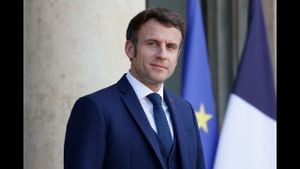President Donald Trump has granted a full pardon to Ross Ulbricht, the founder of the notorious Silk Road, marking a significant event for both the individual and the broader libertarian movement. On January 21, 2025, Trump announced the pardon on his social media platform, Truth Social, following Ulbricht's incarceration since 2015 for operating the darknet marketplace.
Ulbricht, viewed by many as both a criminal and a visionary, was sentenced to life imprisonment without parole after being convicted on several charges, including conspiracy to distribute narcotics and money laundering. His case has often served as a rallying point for critics of the government's stance on cybercrime, particularly within libertarian circles. The Silk Road, which operated from 2011 to 2013, facilitated global trade of illegal goods, most infamously drugs, generating around $200 million.
Trump's online announcement expressed his appreciation for Ulbricht's mother and emphasized his alignment with libertarian values, stating, "It was my pleasure to have just signed a full and unconditional pardon of her son, Ross." Many libertarians and cryptocurrency advocates welcomed the decision, seeing it as validation for their years of campaigning for Ulbricht's release.
Born on March 27, 1984, Ross Ulbricht grew up in Austin, Texas, and excelled academically, earning degrees from notable universities. His early interests, particularly his fascination with libertarian economic principles and digital privacy, led to the inception of Silk Road, where transactions were conducted anonymously using bitcoin. The creation of this platform not only provided users with hidden identities but also contributed significantly to the early adoption of cryptocurrency.
Ulbricht operated Silk Road under the pseudonym ‘Dread Pirate Roberts,’ inspired by the character from the movie The Princess Bride. During its peak, the marketplace became known as a hub for illicit sales, creating considerable revenue and drawing the attention of law enforcement agencies. The FBI's action taken against Ulbricht marked the swift demise of the operation, as he was captured in October 2013.
At his trial, Ulbricht faced allegations beyond mere drug distribution, including claims of soliciting murders to protect his enterprise, charges he vehemently denied. Despite these allegations, Ulbricht consistently maintained he had relinquished control of Silk Road before his arrest. He expressed remorse during the sentencing, stating, “I wanted to empower people to make choices in their lives and have privacy and anonymity.” Nevertheless, U.S. District Judge Katherine Forrest sentenced him to life imprisonment, emphasizing the groundbreaking nature of his actions and their consequences.
Over the years, Ulbricht's case gained traction among libertarian groups, who branded him as a political prisoner unjustly punished for his role as an entrepreneur operating on the fringes of technology and law. Campaigns to “Free Ross” escalated, manifesting through online petitions and public rallies. Trump’s involvement began to take shape at the Libertarian National Convention, where he promised to commute Ulbricht’s sentence.
Trump’s pardon was seen as fitting within his administration’s broader approach to using presidential power liberally. Following his election, Trump had made several high-profile pardons, including some related to the January 6 Capitol incident. His pardon of Ulbricht was layered with political motivations, as he acknowledged the increasing influence of the cryptocurrency community who largely supported his presidential campaign.
While many celebrated the pardon, drawing attention to the potential for Ulbricht to rebuild his life, critics noted the stark nature of his crimes and the tragic circumstances surrounding the illicit activities conducted via Silk Road. Trump's social media response to the backlash articulated his defense, calling those who prosecuted Ulbricht “scum,” aligning their actions with those directed toward him during his political battles.
Angela McArdle, Chair of the Libertarian National Committee, praised Trump’s decision, calling it one of their top priorities, and framing Ulbricht’s situation as emblematic of government overreach. Similarly, Ulbricht’s attorney Brandon Sample expressed gratitude, describing the pardon as an “extraordinary act of grace” and underscoring its potential to allow Ulbricht the chance to contribute positively to society.
Ulbricht's case, intertwined with themes of technology, freedom, and law, remains highly contentious, reflecting broader discussions on drug policy, cyber regulation, and the justice system's handling of cases involving digital crimes. Trump's decision not only reshapes Ulbricht’s future but also reignites the debate about the role of government in personal freedoms and the legal boundaries of technology-driven marketplaces.



